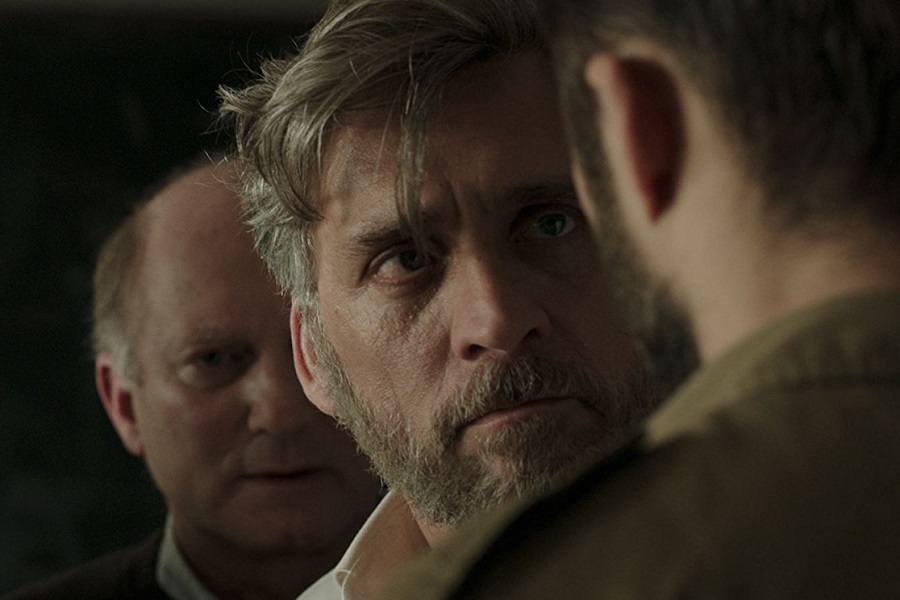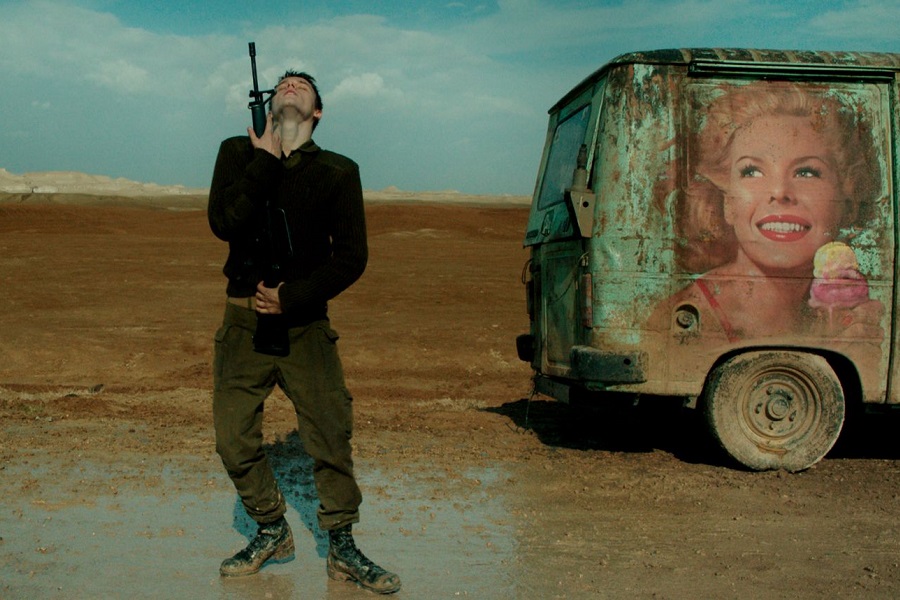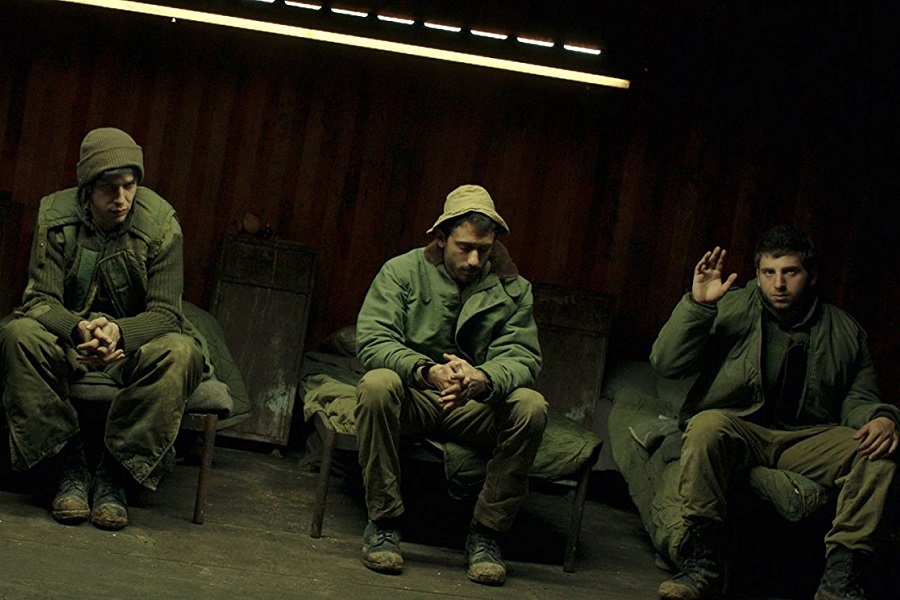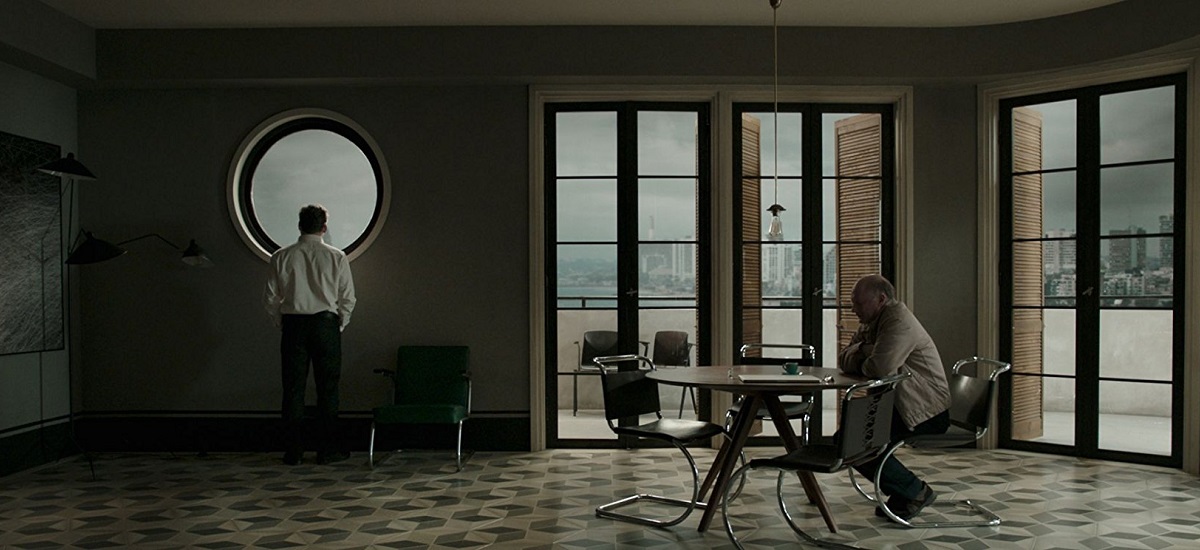Foxtrot is without a doubt a work of ART. Full stop. The kind of movie where in the first several minutes, you are well aware you’re witnessing something special. A deliriously assured combination of story, camera work, mood and acting, it’s truly unforgettable. Only a master craftsman could imbue every single frame with this much information, this much pathos, or this much silence. And yet, this is only Samuel Maoz’s second feature film. After bursting onto the scene in 2009 with Lebanon, the talented filmmaker all but disappeared, save for a short film and documentary in 2013. The wait was worth it and should almost be encouraged in the future, if all his output is this good.
The plot is almost threadbare in explanation, but opens the doors to a wealth of introspection. A family suffers a loss. At some time prior, a soldier tries to find solace and humor in a desolate border stop, where trouble could mount at any moment. Impulsive acts shatter both a fragile mind and a family legacy. Describing the effects are simple, viewing them devastating. Moaz employs a three act structure that plays with preconceived expectations and judgments, only to subtly switch the very nature of those stances. It is the utmost delicate of moves, one whose weight will be all the worse upon repeat viewings.

In the first section, Michael (Lior Ashkenazi) and Daphna (Sarah Adler) Feldman, a seemingly wealthy Israeli family, are undone by a single knock at the door. The men on the other side inform them their son, Jonathan (Yonaton Shiray) has died while serving in the army. Shock strikes the relaxed family to their core, as the rest of the world seems to fade away.
Silence and pause is a powerful tool. In fact it’s what makes Foxtrot‘s most powerful segments come alive. The second act embraces this notion, as it follows Jonathan in the days leading up to his death. He sleeps, along with three other soldiers, in a metal container that’s slowly sinking into the earth, at an angle.
The final act catches up with the Feldmans in an undisclosed future. Arguably the wordiest section, it’s also the most painful of them all. Drifting aimlessly due to unchecked emotions, the surviving family comes together for one night. There’s a desire in movies like this for everyone to scream and yell their feelings, as if the louder a person is, the more true they become. The opposite, as is done here, is far more powerful.

Few films manage to be as lyrically beautiful, or poignantly potent as this one. Without the collaboration between Director Moaz, Art Director Francis Soeder (A Dangerous Method
) and Cinematographer Giorja Bejach (Big Bad Wolves), Foxtrot would run the risk of falling apart. Together, they create instances that feel like paintings or photographs come to life. The way Bejach manipulates a wide lens recalls both Russian Ark and the works of Roy Andersson. Which is to say it is ridiculously sumptuous, and also perfectly conveys the emotions of the scene. Alternating between close up and wide empty spaces ends up saying more than monologues or soliloquies could ever hope to match. Some may find these moments boring or tedious, as they don’t rely on grand proclamations.
What’s most impressive is that while the spectre of loss is hanging over every frame, Foxtrot never falls into the trap of being overly dour. There’s actually a fair amount of humor spread throughout, which naturally gravitates towards the dark variety, given the subject matter. That’s largely the point. The humor that’s displayed here isn’t of the gut-busting variety, but a momentary distraction, in the hopes of keeping the horrors of reality at bay. Several times the topic of referring to passed soldiers only as “fallen” is broached. Each time, the laugh it elicits is all more pained and all the sharper. An animated bedtime story at first seems jokingly explicit, but under its surface is a portrait of a man’s adulthood destroyed by teenage lust.

By and large some of the best films ever made came from an exploration of what it means to be human. Often that manifests itself by dissecting how people react to everyday situations. How the simplest of alterations in one person’s life can throw everything into chaos. Or how the most mundane of interactions leads to someone finding their way, where grief, despair, guilt and loss are given equal measure. Attempting to juggle those topics with a steady hand seems unfathomable. When those elements do come together, it’s a treat not only for the viewer, but for the cinematic world at large. Foxtrot is that kind of film. To miss it, and the kinds of discussions it is sure to provoke, would be a regrettable mistake.
SaveSave


